Spanish surnames - apellidos
Wednesday, November 26, 2025
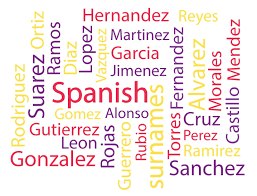 Spanish surnames (apellidos - they have two, one from their father and another from their mother) can be classified into four main types. Spanish surnames (apellidos - they have two, one from their father and another from their mother) can be classified into four main types.
Knowing about the past allows us to learn a bit more about ourselves, where our culture comes from, what our history is, what our families were like.
[Image courtesy of Wikipedia]
All this has been concentrated into our surnames, a link which informs us about our past.
 In an article for AS, the Spanish sports daily, Marta Tejedor talks readers through the four categories. In an article for AS, the Spanish sports daily, Marta Tejedor talks readers through the four categories.
***
I've edited Marta's article but left it in Spanish. Most of you diligent students of the language should be able to understand it. If not, when I find the time to translate it, I shall be posting an English version, here:
Puntos de vista - a personal Spain blog
¡Suerte!
Los apellidos españoles se dividen en cuatro tipos: comprueba a cuál pertenece el tuyo
Historia de Marta Tejedor
2 minutos de lectura
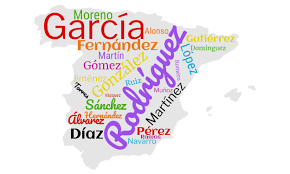 Según OK Diario, los expertos han creado cuatro tipos principales de apellidos españoles en los que se pueden clasificar. Según la categoría a la que pertenezcan, el apellido en cuestión puede dar una cierta información sobre su origen. Según OK Diario, los expertos han creado cuatro tipos principales de apellidos españoles en los que se pueden clasificar. Según la categoría a la que pertenezcan, el apellido en cuestión puede dar una cierta información sobre su origen.
[ElPlural.com]
Entre estas categorías están los apellidos patronímicos, toponímicos, derivados de nombres comunes y derivados de oficios o profesiones.
¿A qué tipo de apellido pertenece el tuyo?
Patronímicos
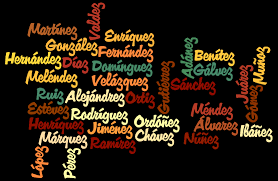 Este tipo de apellidos indican el nombre del padre o antepasado del que se origina. Son muy comunes en España y en algunos países hispanohablantes. Entre ellos destacan algunos como Pérez, que significa “hijo de Pedro”; Sánchez, “hijo de Sancho”, o Fernández, “hijo de Fernando”. Este tipo de apellidos indican el nombre del padre o antepasado del que se origina. Son muy comunes en España y en algunos países hispanohablantes. Entre ellos destacan algunos como Pérez, que significa “hijo de Pedro”; Sánchez, “hijo de Sancho”, o Fernández, “hijo de Fernando”.
Este tipo de apellidos suelen terminar en -ez, -az, -iz, -oz, -uz.
[Facebook]
Toponímicos
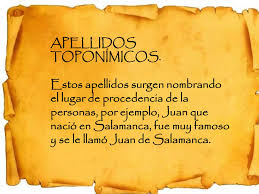 En esta categoría entran todos los apellidos cuyo significado indica el lugar de origen o de residencia del portador de sus antepasados, según informa YouTube. Curiosamente, algunos ejemplos de estos apellidos son Torres, Castellano o Castillo, todos ellos provenientes de Castilla. Otros ejemplos son Navarro y Navarrete, ambos provenientes de Navarra. En esta categoría entran todos los apellidos cuyo significado indica el lugar de origen o de residencia del portador de sus antepasados, según informa YouTube. Curiosamente, algunos ejemplos de estos apellidos son Torres, Castellano o Castillo, todos ellos provenientes de Castilla. Otros ejemplos son Navarro y Navarrete, ambos provenientes de Navarra.
[Slideshare]
Derivados de nombres comunes
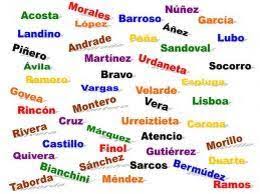 Muy parecidos a los patronímicos, esta categoría de apellidos se basa en algún rasgo físico, moral o religioso del portador o de sus antepasados. El apellido Rubio es un claro ejemplo de cómo un rasgo físico de un antepasado se ha quedado plasmado en sus descendientes. Otros ejemplos como Bravo eran motivos de un acto valeroso o de personas a las que se les consideraban valientes. Cruz, por ejemplo, puede significar “cruzado” o “devoto de la cruz”. Muy parecidos a los patronímicos, esta categoría de apellidos se basa en algún rasgo físico, moral o religioso del portador o de sus antepasados. El apellido Rubio es un claro ejemplo de cómo un rasgo físico de un antepasado se ha quedado plasmado en sus descendientes. Otros ejemplos como Bravo eran motivos de un acto valeroso o de personas a las que se les consideraban valientes. Cruz, por ejemplo, puede significar “cruzado” o “devoto de la cruz”.
[Euribor hoy]
Derivados de oficios o profesiones
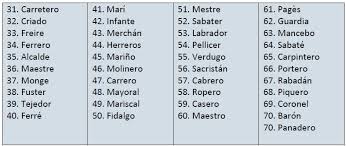 En esta categoría se encuentran todos los apellidos cuyo significado recae sobre la actividad laboral o social del portador o de sus antepasados. Algunos ejemplos son Tejedor, Pastor, Herrera o Molina, este último proveniente del trabajo de un molinero. En esta categoría se encuentran todos los apellidos cuyo significado recae sobre la actividad laboral o social del portador o de sus antepasados. Algunos ejemplos son Tejedor, Pastor, Herrera o Molina, este último proveniente del trabajo de un molinero.
[Letra 15]
Pero no todo se reduce a estos cuatro tipos: también hay apellidos que proceden de apodos basados en el sobrenombre del portador, como pueden ser los casos de Gordo o Largo.
 
Largo [Cartoon courtesy of Dreamstime] Gordo [Cartoon courtesy of Freepik]
Una amiga mia en la universidad tenia el apellido Delgado ..... y lo era. Y tambien muy guapa.
Conclusion:
So, how was it for you? An English version is coming soon to the blog ..... Puntos de vista - a personal Spain blog
© Don Pablo
Images:
AS, Dreamstime, ElPlural.com, Euribo hoy, Facebook, Freepik, Letra 15, Slideshare, Wikipedia, YouTube,
Acknowledgements:
Don Pablo, Paul Whitelock, Wikipedia
Tags:
apellido, Castellano, Castilla, Castillo, “cruzado”, Bravo, Cruz, Delgado, “devoto de la cruz”, English, Fernández, Gordo, Herrera, “hijo de Fernando”, “hijo de Pedro”, “hijo de Sancho”, Largo, Marta Tejedor, Molina, molinero, Navarra, Navarrete, Navarro, OK Diario, Pastor, Pérez, Rubio, Sánchez, Spanish, "Spanish Matters", surname, Tejedor, Torres,
 0
Like
Published at 3:21 PM Comments (0)
0
Like
Published at 3:21 PM Comments (0)
La Caña
Monday, November 10, 2025
 The word "la caña" has many meanings, which is why I decided to place this article in "Spanish Matters". I think it could be interesting for foreigners learning Spanish. I certainly found the research fascinating. The word "la caña" has many meanings, which is why I decided to place this article in "Spanish Matters". I think it could be interesting for foreigners learning Spanish. I certainly found the research fascinating.
Sugar cane [EOS Data Analytics]
The article is in English, although some of the sources listed are in Spanish.
"La Caña"
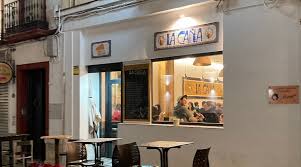 I was inspired to write this piece the other day while I was enjoying a lunchtime beer and a couple of tapas in a fairly new bar in Ronda (Malaga) called "La Caña". It's been open just over two years. I was inspired to write this piece the other day while I was enjoying a lunchtime beer and a couple of tapas in a fairly new bar in Ronda (Malaga) called "La Caña". It's been open just over two years.
I've been several times before and I like it. It's a great addition to the tapas scene in Ronda.
"La Caña", Ronda [Trip Advisor]
Why do I like it?
 Well, I am always made to feel welcome by the staff, propietaria Laura and the real boss, apparently, cousin Maria. Sometimes Laura's dad, Maria's uncle, is there too. Well, I am always made to feel welcome by the staff, propietaria Laura and the real boss, apparently, cousin Maria. Sometimes Laura's dad, Maria's uncle, is there too.
He was the "brains" behind the conversion and the extant style, but he leaves his daughter and niece to run the place.
On this pàrticular day, Friday, I had just successfully sorted out a problem at the bank, so I was in a good mood, and thought I deserved a nice beer.
Maria and Laura, "La Caña" [Photo: PW]
And that's what I got at "La Caña", "Alcazar" from Jaen (Jaen), one of my favourite Spanish beers.
I was also a little "peckish" (no breakfast), so I ordered a couple of tapas.
  
I love "Alcazar" beer rajos un montadito
[All food photos by Don Pablo]
Other uses of "caña"
Caña de cerveza
 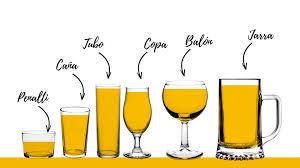
una caña de Mahou [Mahou] Beer measures [Heraldo de Aragon]
Caña de azucar


[EOS Data Analytics] [Saveur]
Caña de pescar
 
[EL PAIS] [Asso Fishing Line]
Caña - reed in wind instruments
 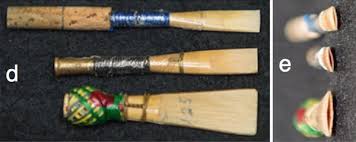
una caña [Top oboe reed shop] Reeds for different wind instruments [UNSW]
Caña - part of the leg between knee and ankle
 
[WikiHow] [nanodas.com]
Caña - a licor

Licor La Caña [proava]
© Don Pablo
Photos:
Asso Fishing Line, Don Pablo, EL PAIS, EOS Data Analytics, Heraldo de Aragon, Mahou, nanodas.com, PW, Paul Whitelock, proava, saveur, Top oboe reed shop, Trip Advisor, UNSW, WikiHow
Thanks:
Don Pablo, PW, Paul Whitelock,
Tags:
Alcazar, caña, caña de azucar, caña de pescar, caña licor, Don Pablo, La Caña, Laura, Maria, part of the leg between knee and ankle, PW, Paul Whitelock, The Guiri Gourmet, reed, wind instrument,
 2
Like
Published at 3:00 PM Comments (2)
2
Like
Published at 3:00 PM Comments (2)
Y tú. ¿Cómo te llamas?
Wednesday, September 17, 2025
 Would you buy a Rolls-Royce Silver "Dung"? Or a Mazda "shitty"? Or even a Mitsubishi "Wanker"? What about an Opel "that doesn't work"? Or a Volkswagen "with a hole in the middle"? Would you buy a Rolls-Royce Silver "Dung"? Or a Mazda "shitty"? Or even a Mitsubishi "Wanker"? What about an Opel "that doesn't work"? Or a Volkswagen "with a hole in the middle"?
[Plastmodel]
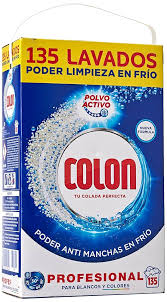 As for drinks, there are some wonderful products on sale: As for drinks, there are some wonderful products on sale:
Do you fancy a "Pschitt"?
Or a "Bite the wax tadpole" (Coca Cola in Japanese)?
What about washing your clothes in "Colón"?
[Wikipedia]
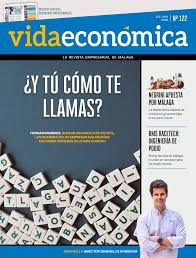 Note: Note:
This post is in English.
It is based on a much longer Spanish article which appeared in August in "Vida Económica", a free monthly magazine.
8,000 copies are distributed every month throughout the province.
[Front cover courtesy of Vida Economica]
Introduction
 Seriously, the naming of products can be a nightmare. Seriously, the naming of products can be a nightmare.
Rolls-Royce, Mazda and Opel got their acts together, but Mitsubishi continue to sell the pajero model in Spanish-speaking markets, despite the fact that pajero means, honestly, "wanker".
Astonishing!
Mazda MR2 (emmerdeux) - I had one! [Clasicos y Usados]
VW perseveres with the Polo model and you can still wash your clothes in a product which means "arse".
Time has moved on
Nowadays companies give much more thought to the naming of their products.
John Pemberton, the inventor of Coca Cola, called his drink so in 1886 because of its ingredients: coca leaves and cola nuts. Despite its meaning in Japanese, Coca Cola won't be changing the name anytime soon.
Nike was born in 1971 when Blue Ribbon Sports changed its name to the Greek goddess of victory, to signify strength and triumph.
 
[Wikipedia] [Pinterest]
Steve Jobs chose the name Apple for his computer company in 1976 allegedly after a visit to an orchard.
The search engine Google arrived in 1997 with a variant of the mathematical term "googol" (the number 1 followed by 100 zeros) to express volume of information.
 
[Apple] [Google]
These days companies have quite sophisticated strategies in an effort to get the name right.
Patronímicos
Using the house name for the company
Roberto Martín, the founder of a national brand of sunglasses.
Casa Kiki, uses the childhood nickname of the founder, Isabel. Bakers and confectioners famous throughout Málaga.
 
[Facebook] [Casa Kiki]
Aceites El Niño, recalls the nickname of Francisco Rodríguez when he used to deliver oil by bicycle.
Los Mellizos was the nickname of the Montes brothers when they were young. Nowadays synonimous with good Andalusian cuisine.
 
[Facebook] [Los Mellizos]
Toponómicos
Using the name of a place as the brand name
Cervezas Victoria has Málaga's DNA. Founded in 1928, this beer's name is a homage to the patron saint of Málaga , la Virgen de la Victoria.
San Miguel, another brewer, with its home near Málaga airport, the origins of this beer are the Philippines. In 1890 Spanish entrepreneurs opened the first brewery in south-east Asia in Manila. They named their beer after the district of Manila called San Miguel. In 1966 the brand arrived in Málaga where it has been brewing beer continuously for almost 60 years. Now a national and international name.
Skandia, a seafood brand, has its origins in the fjords of Scandinavia. Famous particularly for its smoked salmon, the company has an international reach.
  
[Loopulo] [Facebook] [Skandia Ahumados]
Descriptivos
What you see is what you get
Sometimes the best strategy is transparency. If you sell apples, say so.
Todomanzana is the perfect example. It originated from the simple notion of bringing all Apple products and services under the same roof. Sale of computer hardware, software, accessories, repairs.
Maskom. The name of this regional supermarket chain sounds modern and commercial. The creators of the name felt it sounded strong with a touch of Málaga about it.
 
[Above photos courtesy of Cadena SER]
Alfanuméricos y acrónimos
Playing with letters and numbers
Bbou Hotels are a chain of "boutique" hotels. They decided to reinforce their exclusivity with a double "B", a way of underlining the detail, the unique experience and personal attention that these "iconic" hotels offer.
Ly Company is conceived in a declaration of love: "Love you". The company's founder Curro Rodríguez decided to let himself be led by what he felt, ie love for his company. LY's star product is Aqualy, a water brand which repeats the formula: "Love you, water".
 
[Above logos courtesy of Linked In]
Salliver is "Revillas" backwards. This is the name of a school which began by offering private classes and which now has thousands of pupils. The school is in Fuengirola.
OXO Museo del Videojuego
 
[Linked In] [La Proxima Parada]
Neológicos
Utter invention with a taste of brand
Harper & Neyer. "Who were they?" Nobody, they are invented names. The company's founder, Nabil Salah, wanted to create a fashion brand that sounded international, was elegant and had hints of Anglo-Saxon tradition. It seems to have worked.
Coonic is more subtle. This communications agency was inspired by the ultrasonic communication between whales. The double "O" is part of the visual symbol of the brand.
Opplus is not a Málaga company, yet everybody knows it has special ties to the city. The name signifies that their operations have a "plus" of quality, of promise and of excellence.
  
[Modaes] [Linked In] [La Opinion de Malaga]
Conceptuales
Names which tell a story or provoke an emotion
Owo is one of the shiniest jewels of Málaga's technological eco-system. Signifying a world that opens to a touch. The name, short, symmetrical and graphic, works in all languages.
Froged combines "frog" with "Ed", "frog" being the virtual companion to the consumer, an AI agent who guides the client in real time.
 
[Facebook] [El Correo de Andalucia]
Bumpers Brand has a conceptual almost poetic origin. The founders of the company, five friends, appropriated the Welsh word "pump", meaning five. From that they have developed a brand of clothing with a spirit of community.
El Pimpi. Originally the nickname of a "buscavidas" (hustler) from Málaga, half tourist guide, half raconteur. When the current owners of the bar bought the former night club, it bore the name "El Pimpi". They decided to keep it, aware that it was more than just a name, it had "soul".
Personal note:
I have been to El Pimpi umpteen times. I love the environment and the vibe, but, at certain times getting served can be a nightmare. Nevertheless, it's a great place to go!
 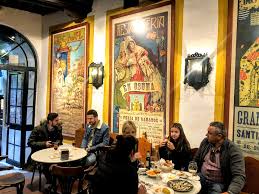
[ViviMarbella] El Pimpi, Malaga [Gastroactitud]
Links:
Lost in translation? Marketing cock-ups and brand name howlers - Secret Serrania
‘What's in a Name?’: Definition, Meaning, and Examples - Writing Tips Institute
What’s in a name? Pedro y Pablo - Eye on Spain
'What's In A Name': Phrase Meaning & History✔️ No Sweat Shakespeare
© Don Pablo
Pictures:
Apple, Cadena SER, Casa Kiki, Clasicos y Usados, El Correo de Andalucia, Gastroactitud, Google, Los Mellizos, Pinterest, Plastmodel, Vida Economica, ViviMarbella, Wikipedia
With special thanks to:
David Delgado, Don Pablo, Vida Economica
Tags:
accessories, Aceites El Niño, Apple, Aqualy, Bbou Hotels, "Bite the wax tadpole", Bumpers Brand, buscavidas, Cadena SER, Casa Kiki, Clasicos y Usados, Coca Cola, "Colon", computer hardware, Coonic, Curro Rodriguez, David Delgado, Don Pablo, El Correo de Andalucia, El Pimpi, Eye on Spain, Facebook, Francisco Rodriguez, Froged, Gastroactitud, Google, googol, Harper & Neyer, hustler, John Pemberton, La Opinion de Malaga, La Proxima Parada, Linked In, Loopulo, Los Mellizos, Ly Company, Malaga, Maskom, Mazda "shitty", Mitsubishi "Wanker", Modaes, Nike, No Sweat Shakespeare, Opel "that doesn't work", Opplus, Owo, OXO Museo del Videojuego, Paul Whitelock, Pinterest, Plastmodel,"Pschitt", repairs, Roberto Martin, Rolls-Royce Silver "Dung", Salliver, Secret Serrania, Skandia Ahumados, software, Steve Jobs, Todomanzana, Vida Economica, ViviMarbella, Volkswagen "with a hole in the middle", Wikipedia, Writing Tips Institute
 0
Like
Published at 9:34 PM Comments (0)
0
Like
Published at 9:34 PM Comments (0)
MALAGA - The best place in Spain to retire to
Friday, May 23, 2025
 Malaga? Better than Madrid or Barcelona? By a kilometre, according to the UK tabloid newspaper the Daily Mirror. Malaga? Better than Madrid or Barcelona? By a kilometre, according to the UK tabloid newspaper the Daily Mirror.
Well, I think they may have a point.
For a long time overlooked by foreigners who would fly into the airport and then head west to their hotel or holiday apartment.
[Image courtesy of The Guardian]
Why?
After several major facelifts, including the Roman amphitheatre, the development of the port, the sprucing up of the Old Town and the acquisition of a number of prestigious art galleries, such as the Picasso Museum and the Pompidou Centre.
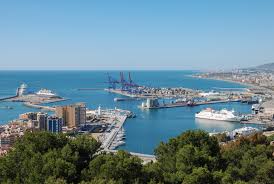 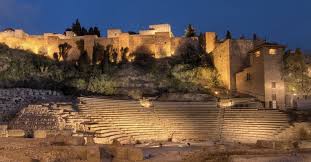 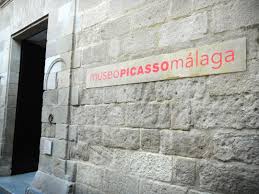
Malaga port [Wikipedia] Roman amphitheatre [andalucia.org] Picasso Museum [Wikipedia]
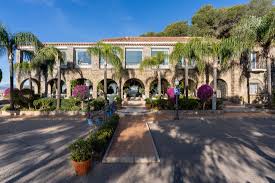 I've always liked Malaga City, from the early days, 2000 onwards when we would often stay a night or two at the Parador de Gibralfaro. I've always liked Malaga City, from the early days, 2000 onwards when we would often stay a night or two at the Parador de Gibralfaro.
The views are stunning, the rooms stylish with antique furniture and the food was good, I remember.
But the recent makeover has made the city even more enticing.
Parador de Gibralfaro [Paradores]
]***
Now it's time for some Spanish.
The following article is from the Cadena SER website.
I think the article is relatively straightforward for competent Spanish learners.
La ciudad española que los medios británicos recomiendan como "el mejor lugar" para retirarse
Historia de Cadena SER
2 minutos de lectura
El medio 'Mirror' ha asegurado que el destino destaca por su "estilo de vida relajado" y su "centro cultural".
No es sorprendente que el Reino Unido recomiende frecuentemente nuestro país como uno de los mejores destinos a los que su población puede acudir para una escapada vacacional. Las bellas playas, la buena comida o la vida relajada son algunos de los motivos más repetidos entre la prensa británica para animar a sus lectores a acudir a España si desean encontrar la tranquilidad.
Una recomendación que repite ahora el diario 'Mirror', que ha recomendado a su audiencia uno de los destinos españoles más visitados, pero en el que los turistas podrán disfrutar de "un estilo de vida relajado".
Y es que, además, el medio británico no solo recomienda visitar este lugar, sino que además lo ha destacado para aquellas personas que deseen retirarse fuera del Reino Unido.
Playas y buen tiempo
De esta forma, el 'Mirror' ha recomendado a los británicos la ciudad de Málaga, en Andalucía, donde animan a los 'brits' a visitar "este precioso lugar" que "supera a lugares como Barcelona o Madrid".
Son varios los motivos por los que el medio británico recomienda la ciudad andaluza, uno de los puntos de más interés turístico de España. " Las playas son el mayor atractivo de la región, con kilómetros y kilómetros de costas arenosas", se puede leer en el diario, que además destaca que en muchas de ellas se "admiten perros".
Y no solo eso, porque el 'Mirror' insiste en que el centro cultural de Málaga, destacado por su "ambiente cultural vivo", es otro de los atractivos por los que recomiendan a sus ciudadanos a plantearse una retirada allí.
"El tiempo y el transporte de Málaga, comparado con otros destinos españoles, son otros de los factores que la alzan en el ranking", concluye el medio británico.
[Source: La ciudad española que los medios británicos recomiendan como "el mejor lugar" para retirarse | Sociedad | Cadena SER]
You might also be interested in a couple of articles I have written about the city. Link here:
MALAGA CITY - Help me, Ronda
© don Pablo
Pictures:
Facebook, Karl Smallman, Paul Whitelock, Wikipedia
Acknowledgements:
Cadena SER, don Pablo, Wikipedia, www.help-me-ronda.com, www.secretserrania.com
Tags:
Barcelona, Cadena SER, Daily Mirror, development of the port, Facebook, Karl Smallman, Madrid, Malaga, Malaga City, Parador de Gibralfaro, Paul Whitelock, Picasso Museum, Pompidou Centre, prestigious art galleries, sprucing up of the Old Town, Wikipedia, www.help-me-ronda.com, www.secretserrania.com
 1
Like
Published at 8:48 AM Comments (0)
1
Like
Published at 8:48 AM Comments (0)
A country divided
Saturday, April 19, 2025
Spain is a country divided by its regional languages and accents. Indeed, it was not until Fernando de Aragon and Isabel de Castilla "jumped the broom" and effectively united t country, what we now know as Spain was a collection of separate kingdoms and states, with their own languages, dialects and accents.
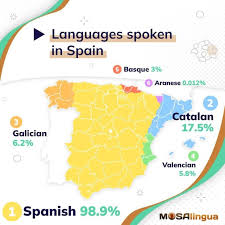 Nowadays, post-Franco Spain has six official languages. Nowadays, post-Franco Spain has six official languages.
They are: castellano (Castilian Spanish); asturiano; catalan; euskera (Basque); gallego; and valenciano.
The rest, such as andaluz, extremeño and murciano,. are merely dialects or accents.
Languages Map of Spain [courtesy of MosaLingua]
Is Spain divided?
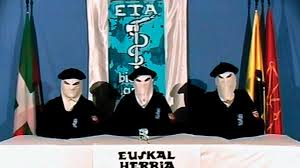 There are separatist tendencies in some areas, mainly Cataluña and the Basque Country. The strongest movement is in Cataluña, of which Spain's second city Barcelona is the capital, although the Basques have long desired independence especially in the late 20th Century when the ETA terrorist movement was effectively at war with Spain (think IRA in Ireland). There are separatist tendencies in some areas, mainly Cataluña and the Basque Country. The strongest movement is in Cataluña, of which Spain's second city Barcelona is the capital, although the Basques have long desired independence especially in the late 20th Century when the ETA terrorist movement was effectively at war with Spain (think IRA in Ireland).
[Photo: Grupo Prisa]
However, the Spanish central government has no desire to go down the independence route. In fact, it is unconstitutional. Plus opinion polls show that most Catalans are happy to remain as part of Spain.
As for rivalry between different regions, that's another matter. Andaluces hate Basques, Catalans and madrileños; Basques are aloof; Catalans hate everybody else; and the rest aren't bothered.
 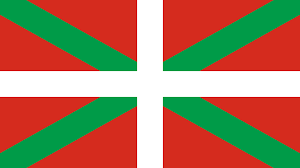 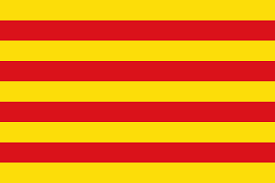
Flags of Andalucia, Pais Vasco and Cataluña all courtesy of Wikipedia
What about other countries?
 They say that the USA and England/the UK are two countries divided by the same language. They say that the USA and England/the UK are two countries divided by the same language.
To some extent that's true: trunk v boot (automobile/car); hood v bonnet (ditto); john v toilet/wc; movie v film and so it goes on.
In such a big country there is also a wide range of accents.
The national languages spoken in the USA are English, Spanish and French. The Amish community speak a form of German.
[Courtesy of The Sheffield Star newspaper]
All countries have their regional accents. In the UK Glaswegians are unintelligible to most other speakers of English from other areas, especially "darn sarf" (down south).
Many English southerners have problems with "scouse", "geordie" and the Welsh and Northern Ireland accents. The reverse also applies. My pal at university, Mel from Belfast (NI), spent a week with me and my family in Devon, back in the 1970s, and he didn't understand a word the entire time, he told me afterwards.
In Germany I defy a Hochdeutschsprecher from Hanover to understand a fellow German from Baden-Wuerttemberg where Badisch and Schwabisch rule. As for a fluent German-speaker like I am, well, no chance!
The Bavarian accent is also demanding, but if you cross the southern border into Austria or Switzerland, forget it! Swiss German (Switzerdeutsch) is not generally understood by most Germans, and the Austrian accent also presents its challenges (cf. Adolf Hitler's speeches at rallies in the run-up to World War II).
In my own case, an honours graduate in German and Spanish, I ended up in later life living in Andalucia married to a German lady from Lippe (North Rhine Westphalia). Most of her family live in Baden-Wuerttemberg and we visit frequently. To begin with whenever we were there I couldn't understand a word!!!
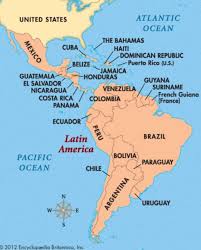 There is a wide range of different accents in Central and South America. There is a wide range of different accents in Central and South America.
In many countries of the region, such as Argentina, Mexico, Paraguay and Uruguay, the castellano spoken by the conquistadores has largely survived albeit in an antiquated form.
In other countries the Spanish has been influenced greatly by the indigenous languages of the indios (original inhabitants).
Chile, Colombia, Ecuador, and Peru, for example, speak a form of Spanish which is remarkably different from the castellano of 500 years ago.
[Map courtesy of Pinterest]
Endword
Because the dominant and most successful colonialists of the 15th and 16th centuries were the English and the Spanish, if you speak both English and Spanish well, you can get by in most of the world. French, Dutch and German also help in certain areas where they acquired colonies, but less so.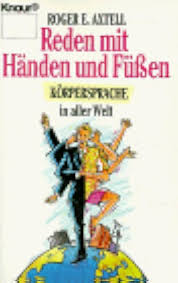
On a personal level, with my German and Spanish plus French to A-Level, I can get by in most of the world.
I would struggle in China, North Korea and Russia, but I have no intention of visiting any of those places anytime soon. I am linguistically content.
When all is said and done, we're all human beings and if we wish to communicate with speakers of other languages, we manage, don't we?
As Rita my German wife says "mit Handen und Fussen" (lit. with hands and feet, ie by the use of gestures).
[Image courtesy of Amazon.de]
© don Pablo
Photos and images:
Amazon.de, Grupo Prisa, MosaLingua, Pinterest, Sheffield Star
Acknowledgements:
don Pablo, Paul Whitelock, Wikipedia
Tags:
Amazon.de, don Pablo, Grupo Prisa, MosaLingua, Paul Whitelock, Pinterest, Sheffield Star, Wikipedia
 0
Like
Published at 8:59 AM Comments (0)
0
Like
Published at 8:59 AM Comments (0)
"Roses are red, violets are blue ....."
Monday, March 17, 2025
Red is rojo and blue is verde - ¿Qué?
 Our "Spanish Matters" topic today revolves around colours. Our "Spanish Matters" topic today revolves around colours.
Both English and Spanish are very "colourful" languages which use metaphors, similes and symbolism to great effect.
But they do not often correspond in the two languages.
[Image courtesy of Wild Lark]
Colours are used to describe, well, the colour of things. But they are also used figuratively to convey other meanings.
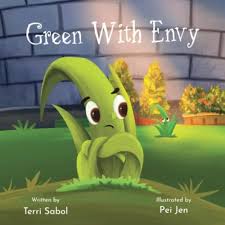 For example, Peter is green with envy; Mary is feeling blue (sad); It was a black day for Liverpool (the "Reds") when they lost the Carabao Cup Final to Newcastle United on 16 March 2025; yellow = cowardly; and so on. For example, Peter is green with envy; Mary is feeling blue (sad); It was a black day for Liverpool (the "Reds") when they lost the Carabao Cup Final to Newcastle United on 16 March 2025; yellow = cowardly; and so on.
But are they used consistently in this way in English and Spanish? "No way, José!"
[Image courtesy of Amazon]
red/rojo
Expressions in English like "red mist", "red lines" and a "red-eye" flight do not have Spanish equivalents using the adjective rojo.
Others
 For him it's like a red rag to a bull = es lo que más le saca de quicio For him it's like a red rag to a bull = es lo que más le saca de quicio
to go into the red = contraer deudas
to go as red as a beetroot = ponerse como un tomate
reds under the bed = la amenaza comunista
caught red-handed = pillado con las manos en la masa
[Cartoon courtesy of LinkedIn]
blue/azul
Lots of terms and expressions in English, such as blue-jeans, blue joke, and blue-collar worker, do not have equivalents in Spanish using azul.
Others
a blue film = una película porno
His death came out of the blue = Su muerte cayó como una bomba
He's got the blues = Está deprimido
once in a blue moon = de Pascuas a Ramos
you can shout till you're blue in the face = puedes gritar hasta hartarte
[Image courtesy of US Adult Literacy]
 yellow/amarillo yellow/amarillo
Expressions using yellow are commonly translateable between English and Spanish.
However, the yellow press is la prensa sensacionalista and he has a yellow streak (ie is a coward) is translated as es un poco gallina (chicken) or miédica.
[Image: Adobe Stock]
green/verde

In English green often has the sense of naive or inexperienced (except in the context of gardening, eg green-fingered), whereas in Spanish it is often a pejorative adjective for a person or a thing that is sexually "dodgy".
Others:
Paqui was very green when it came to relationships with men = Paqui era muy naive .....
un viejo verde = a dirty old man
una revista verde = a porn mag
una película verde = a "skin flick" or pornographic movie
[Cartoon courtesy of Facebook]
Acknowledgements:
Adobe Stock, Amazon, Facebook, LinkedIn, US Adult Literacy, Wild Lark
© don Pablo
Tags:
16 March 2025, Adobe Stock, Amazon, as red as a beetroot, azul, black day, blue, blue-collar worker, blue film, blue in the face, blue-jeans, blue joke, Carabao Cup Final, colours, cowardly, don Pablo, English, Facebook, feeling blue, go into the red, green with envy, LinkedIn, Liverpool, metaphors, Newcastle United, "No way, José!", once in a blue moon, out of the blue, red, "red-eye" flight, "red lines", "red mist", red rag to a bull, "Reds", reds under the bed, rojo, similes, Spanish, "Spanish Matters", symbolism, the blues, US Adult Literacy, verde, Wild Lark, yellow,
áéíóú
 0
Like
Published at 5:07 PM Comments (0)
0
Like
Published at 5:07 PM Comments (0)
Moving to Spain from another country
Thursday, March 13, 2025
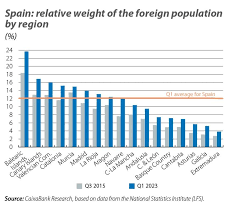 Spain is now home to several million foreigners. Whether refugees from conflict zones or hostile regimes, economic migrants or as a lifestyle choice. The largest group of immigrants are the British, followed by Moroccans, Romanians, German, Dutch and French. Increasingly Americans are opting to get out of Trump’s chaotic USA and moving to Europe, in particular Spain. Spain is now home to several million foreigners. Whether refugees from conflict zones or hostile regimes, economic migrants or as a lifestyle choice. The largest group of immigrants are the British, followed by Moroccans, Romanians, German, Dutch and French. Increasingly Americans are opting to get out of Trump’s chaotic USA and moving to Europe, in particular Spain.
[Map courtesy of CaixaBank Research]
Introduction
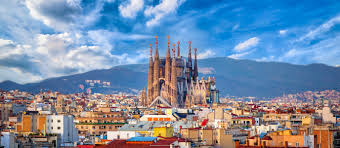 Don Pablo came across this article about a young Californian lady, whom he actually met two days ago. Don Pablo came across this article about a young Californian lady, whom he actually met two days ago.
Shawna Lum moved to Spain in 2015 and has lived in Bilbao, Barcelona and now has her eyes on the Ronda area.
View of Barcelona with Gaudí's Sagrada Familia [Barceló]
Don Pablo has left the article in its original Spanish. Many of you who are learning Spanish should be able to understand it. If not, there’s always Google Translate and at some point soon the article will be posted in English on another blog.
Una estadounidense se muda a España y señala lo que menos le gusta de nuestro país: “Nada es perfecto”
Beto V. Álvarez
Shawna Lum pasó muchos años en Estados Unidos, pero se sentía frustrada con su trabajo, por lo que decidió mudarse a Barcelona y comenzar una nueva vida.
 Mudarse a otro país nunca es sencillo. Acostumbrados a un estilo de vida y a unas condiciones muy concretas, ir a vivir a otro país nos obliga a adaptarnos a una cultura ajena y a una forma de comprender la vida distinta. Mudarse a otro país nunca es sencillo. Acostumbrados a un estilo de vida y a unas condiciones muy concretas, ir a vivir a otro país nos obliga a adaptarnos a una cultura ajena y a una forma de comprender la vida distinta.
Así le ha ocurrido a la estadounidense Shawna Lum. Nacida y criada en Los Ángeles, la joven se mudó en el año 2015 a Bilbao, y ha notado algunas cosas de España que no le gustan, como bien ha explicado a través de su cuenta de Instagram, @shawnalumm.
Shawna Lum [Foto: MSN]
Si bien ella está muy satisfecha con Bilbao, la vida en España tiene algunas particularidades que pueden ser muy molestas para los extranjeros. Como la falta de “infraestructuras de calidad”.
La joven, de 31 años, asegura que en nuestro país hay muchos edificios antiguos que tienen una infraestructura “pobre”, lo que provoca, por ejemplo, muy poco aislamiento frente al frío o frente al ruido de la calle.
Al vivir en Bilbao, el tiempo también le ha jugado una mala pasada. Acostumbrada al clima soleado de Los Ángeles, a Shawna no le gusta el clima extremo que azota al País Vasco durante el invierno, marcado por un “frio gélido”.
“Esto es típicamente más complicado para las chicas que les gusta los climas cálidos, como a mí”, confiesa la joven.
Pese a ser mundialmente famosos por nuestra gastronomía, el sector de la hostelería presenta muchas deficiencias. O así lo considera Shawna, que asegura que los camareros a veces “no prestan atención a los clientes, dejando platos en la mesa o contestándote de mala manera cuando pides demasiado”.
Por último, la falta de puntualidad del transporte público es un problema muy frecuente en la vida de Shawna, y “pone a prueba tu paciencia” todos los días.
Una gran calidad de vida
 Pese a todo, Shawna admite que la vida en España es mucho mejor que la vida que tenía cuando vivía en Los Ángeles. Pese a todo, Shawna admite que la vida en España es mucho mejor que la vida que tenía cuando vivía en Los Ángeles.
Para ella, “lo bueno supera a lo malo”, y su vida en España le ha ayudado a mejorar su vida y reducir significativamente “su estrés”.
“Nada es perfecto. Sigo recomendando mudarse a Madrid. Mi vida es muchísimo mejor”, confiensa la joven.
Shawna Lum settled in Spain [@shawnalumm]
© don Pablo
Fotos:
@shawnalumm, Barceló, CaixaBank Research, MSN
Gracias a:
AS, Beto V Álvarez, Paul Whitelock
Tags:
@shawnalumm, acostumbrada al clima soleado, Americans, another blog, AS, Barceló, Barcelona, Beto V Álvarez, Bilbao, British, CaixaBank Research, calidad de vida, California, conflict zones, don Pablo, Dutch, economic migrants, edificios antiguos, el clima extremo, España, estadounidense, estilo de vida, estrés, extranjeros, falta de puntualidad del transporte público, French, frente al ruido de la calle, Germans, Google Translate, hostile regimes, in English, “infraestructuras de calidad”, Instagram, ir a vivir a otro país, la hostelería presenta muchas deficiencias, largest group of immigrants, la vida en España, la vida en España es mucho mejor, lifestyle choice, “lo bueno supera a lo malo”, Los Ángeles, MSN, Moroccans, moving to Europe, moving to Spain, mudarse a otro país, mudarse a Madrid, muy poco aislamiento frente al frío, “nada es perfecto", “no prestan atención a los clientes, nuestra gastronomía, País Vasco, Paul Whitelock, “pone a prueba tu paciencia”, refugees, Romanians, Ronda, se mudó a Bilbao, several million foreigners, Shawna Lum, Spain, Trump’s chaotic USA, una infraestructura “pobre”, una mala pasada, una nueva vida, un “frio gélido”, Vizcaya
áéíóú
 0
Like
Published at 4:26 PM Comments (0)
0
Like
Published at 4:26 PM Comments (0)
A country divided by its accents
Wednesday, March 12, 2025
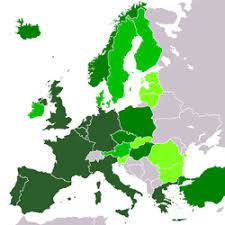 Which country am I talking about? Spain, France, Germany, the UK? Which country am I talking about? Spain, France, Germany, the UK?
Well, all four of them, in fact.
Let's take a look:
[Map courtesy of Wikipedia]
USA v UK
 They say that the USA and the UK are two countries divided by the same language. To some extent that’s true, particularly when it comes to vocabulary, eg hood v bonnet; trunk v boot; john v toilet. But we get by. They say that the USA and the UK are two countries divided by the same language. To some extent that’s true, particularly when it comes to vocabulary, eg hood v bonnet; trunk v boot; john v toilet. But we get by.
Americans from different parts of that huge country sometimes also have problems understanding each other.
[Image courtesy of X]
UK
Other countries have accents too.
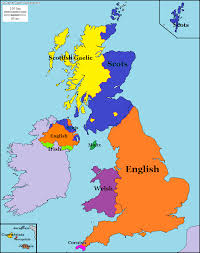 In the UK, Glaswegians are incomprehensible to all but other Glaswegians! In the UK, Glaswegians are incomprehensible to all but other Glaswegians!
Southerners have difficulties with Scouse (Liverpool) and Geordie (Newcastle-upon-Tyne).
When we were students back in the 1970s my pal Mel from Belfast spent some time with me and my family in Devon. He didn’t understand a word all week!
On top of that the revival in interest in Celtic languages, like Scots Gaelic, Welsh and Manx (Isle of Man), means that there are areas of Scotland and Wales where the language of instruction in schools is their version of Celtic.
[Map courtesy of SB Language Maps]
Spain
No Spaniard understands an andaluz.
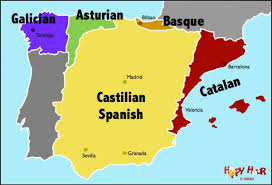 Because there has been a revival of several regional languages, that can also be a problem. Because there has been a revival of several regional languages, that can also be a problem.
Many catalanes refuse to speak castellano to Spaniards from elsewhere.
The Basque language euskera is incomprehensible to a Spanish-speaker.
Other approved regional languages such as gallego, asturiano, valenciano and balear (both dialects of catalán) are also anathema to Castilian-speakers.
[Linguistic map of Spain courtesy of Maps Spain]
Germany
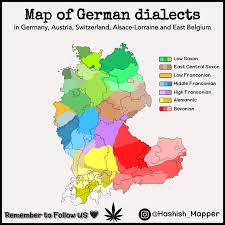 In the third-largest western European country (after France and Spain) I defy a speaker of Hochdeutsch from Hanover to understand an inhabitant of Baden-Württemberg, where Badisch and Schwäbisch rule the roost. In the third-largest western European country (after France and Spain) I defy a speaker of Hochdeutsch from Hanover to understand an inhabitant of Baden-Württemberg, where Badisch and Schwäbisch rule the roost.
The accent in Bavaria is also demanding, but if you cross the border into Austria or Switzerland, you will have even bigger problems.
Swiss German is generally not understood by Germans.
Austrian German also presents some challenges.
[Map courtesy of Instagram]
France
 The biggest and most populous western European country also has regional accents, as you would expect. The biggest and most populous western European country also has regional accents, as you would expect.
In Brittany the locals speak a form of Gaelic, which has nothing in common with French.
Southern French (spoken in le midi) is markedly different to Parisan French.
In Alsace, German is still spoken by older inhabitants, as this region has switched back and forth between France and Germany throughout history. It switched back to France after the Second World War.
The area known as the Languedoc, has a very strong accent, la langue d’Oc.
[Regional dialects/languages of France: Wikipedia]
A personal view
A language is for communication at a higher level than our nearest animal cousins, gorillas, are able to manage.
If the language/accent varies a bit from region to region, that’s logical, but we should be able to overcome that.
 I studied Spanish and German to Honours degree level. I was a languages teacher for 15 years. After that I was a local authority languages adviser and OFSTED inspector. I studied Spanish and German to Honours degree level. I was a languages teacher for 15 years. After that I was a local authority languages adviser and OFSTED inspector.
When I moved to Spain, to Andalucia, I wondered what I’d let myself in for, since andaluz bears little resemblance to the castellano I had learned.
When I visit Germany with my German wife, we invariably go to Baden-Württemberg, where both Badisch and Schwäbisch are totally different to the Hochdeutsch I had learned.
[Photo courtesy of The Guardian]
16 years on and I have gotten used to both andaluz and Schwäbisch, although Swiss German remains a mystery.
Conclusion
I cannot str ess how important it is make the effort to learn some of the language of the country you emigrate to. The quality of your life will only be enhanced. ess how important it is make the effort to learn some of the language of the country you emigrate to. The quality of your life will only be enhanced.
And, in terms of travel, because I speak fluently the languages of the two greatest colonial nations, namely England and Spain, that gives me access to most of the world. German helps a lot in Eastern Europe and French is still spoken around the world.
[Image courtesy of News-Medical]
I don’t speak Russian, Korean nor Chinese, but as I don’t plan to go to any of those countries, I should be alright linguistically.
© don Pablo
Images:
Instagram, Maps Spain, News-Medical, SB Language Maps, The Guardian, Wikipedia, X
Acknowledgements:
don Pablo, Instituto Cervantes, Paul Whitelock, "Spanish Matters"
Tags:
a country divided by its accents, Alsace, American, Andalucia, andaluz, asturiano, Austria, Austrian German, Baden-Württemberg, Badisch, balear, Basque, Bavaria, Belfast, Brittany, castellano, Castilian-speakers, catalanes, Celtic, Celtic languages, Chinese, colonial nation, communication, Devon, don Pablo, Eastern Europe, English, euskera, French, Gaelic, gallego, Geordie, German, German wife, Germany, Glaswegian, gorillas, Hanover, he didn’t understand a word all week, Hochdeutsch, Honours degree level, hood v bonnet, Instagram, Instituto Cervantes, Isle of Man, john v toilet, Korean, la langue d’Oc, language, language of instruction in schools, languages teacher, Languedoc, le midi, Liverpool, local authority languages adviser, Manx, Maps Spain, Mel, Newcastle-upon-Tyne, News-Medical, OFSTED inspector, Parisan French, Paul Whitelock, regional languages, Russian, SB Language Maps, Scotland, Scots Gaelic, Scouse, Spain, Spaniard, Spanish, "Spanish Matters", Spanish-speaker, Schwäbisch, Second World War, Southerners, strong accent, Swiss German remains a mystery, Switzerland, The Guardian, the USA and the UK are two countries divided by the same language, trunk v boot, UK, USA, valenciano, Wales, Welsh, Wikipedia, X
áäéíóöúüàçèê
 0
Like
Published at 7:28 AM Comments (1)
0
Like
Published at 7:28 AM Comments (1)
Spain features in the Top 10 most visited cities in the world
Thursday, January 9, 2025
 Spain is riding the crest of a wave at the moment. According to The Economist, Spain has the second most vibrant economy in the world after Japan. And according to a recent survey, Spain has three cities in the the top ten most visited in the world. Spain is riding the crest of a wave at the moment. According to The Economist, Spain has the second most vibrant economy in the world after Japan. And according to a recent survey, Spain has three cities in the the top ten most visited in the world.
This article in Spanish gives all the details. It should be accessible to those of you learning Spanish in a serious way.
Ni Barcelona ni Sevilla: la mejor ciudad de España para hacer turismo en 2025 es también la segunda del mundo
Historia de Alicia Alarcón (redactada)
Las mejores ciudades para visitar en 2025
Los expertos de ‘Euromonitor International’ han publicado la lista de las mejores ciudades para visitar a nivel mundial en 2025.
 Este año, la medalla de oro ha sido para la conocida ‘ciudad del amor’ o ‘ciudad de la luz’. Este año, la medalla de oro ha sido para la conocida ‘ciudad del amor’ o ‘ciudad de la luz’.
París se ha convertido en el lugar preferido por los expertos en viajes y, de hecho, ha registrado un aumento de visitantes superior al 34% respecto al año anterior. En total, han sido más 70 millones de turistas internacionales los que han pasado por la destacada ciudad.
La Torre Eiffel, el museo del Louvre, el Arco del Triunfo o la Basílica del Sacré Coeur entre otros han sido los lugares más visitados como cada año en la ciudad.
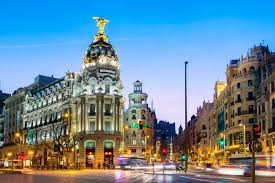 Según el estudio ‘Top 100 destinos que han dado forma al turismo urbano en 2024’, la medalla de plata es para una ciudad de España. Más allá del encanto de Sevilla o Barcelona, Madrid se ha posicionado en segundo lugar como una de las mejores ciudades del mundo para hacer turismo. Según el estudio ‘Top 100 destinos que han dado forma al turismo urbano en 2024’, la medalla de plata es para una ciudad de España. Más allá del encanto de Sevilla o Barcelona, Madrid se ha posicionado en segundo lugar como una de las mejores ciudades del mundo para hacer turismo.
Este año, la capital ha escalado una posición respecto a 2023. Según los expertos, el primero de los motivos por el que la capital española ha conquistado a los jueces es su “robusta estrategia en sostenibilidad”.
La medalla de bronce es para una ciudad asiática
Según la lista publicada por ‘Euromonitor International’, la mejor ciudad del mundo en tercera posición para hacer turismo se encuentra fuera de Europa.
 Según los expertos en turismo internacional, Tokio es una de las mejores ciudades del mundo para visitar, al menos, una vez en la vida. Según los expertos en turismo internacional, Tokio es una de las mejores ciudades del mundo para visitar, al menos, una vez en la vida.
Por detrás de París y de Madrid, esta ciudad asiática destaca por ser “una opción atractiva para celebrar eventos del sector corporativo”.
Lo cierto es que la capital de Japón ofrece en la actualidad múltiples ventajas económicas gracias a la bajada de su moneda, el yen.
Es por este motivo por el que millones de turistas también han apostado en el último año por la ciudad para viajar.
Hablamos de España
El turismo en España ha registrado en el último año los datos más alentadores desde que estalló la pandemia de la COVID-19.
Según los últimos datos, 2024 se ha posicionado como el segundo producto inmobiliario más atractivo de España.
Tras este, los expertos del sector terciario esperan que 2025 sea otro año afortunado para la hostelería y el turismo.
Además, gracias a la última lista publicada sobre las mejores ciudades para visitar en el mundo, España podría tener de nuevo una gran acogida a nivel internacional.
Además, su impresionante infraestructura es un imán para todos los europeos y americanos que desean conocer lugares atractivos y nuevos.
Y, ¿los demás?
Tras el podio se encuentran dos ciudades italianas. La cuarta posición del ranking es para Roma y la quinta para Milán. Ambas son dos opciones ideales muy cercanas entre sí para disfrutar de una experiencia gastronómica única a la vez que cultural.
La sexta posición según los expertos es para la conocida ‘ciudad que nunca duerme’. Nueva York se ha colado un año más en la lista de las mejores ciudades del mundo para hacer turismo.
 A la cola del ranking se sitúan Sídney, Singapur y otra ciudad española con la décima posición. Barcelona es considerada por los expertos una de las principales ciudades para visitar en 2025. A la cola del ranking se sitúan Sídney, Singapur y otra ciudad española con la décima posición. Barcelona es considerada por los expertos una de las principales ciudades para visitar en 2025.
El Consejo General del Consorcio de Turismo de Barcelona ha señalado que cada visitante ha gastado de media en la capital unos 100 euros al día, lo que supone un aumento del 21,12% respecto al año anterior.
España está de suerte y todo señala que 2024 ha sido una gran fecha para el sector turístico y hostelero. Los expertos esperan ahora que el nuevo año sea tan próspero como el anterior.
Más allá de estas ciudades protagonistas, el informe ha destacado la presencia de Estados Unidos, Turquía y China en el panorama turístico ante un importante aumento de llegadas internacionales desde este año hasta 2030.
Epilogue
How did you get on? I don't think it was too difficult.
¿Enhorabuena!
© Don Pablo
Links:
Photos:
Best Diplomats, El Confidencial, Wikipedia
Tags:
Alicia Alarcón, Arco del Triunfo, aumento de llegadas internacionales, Barcelona, Basílica del Sacré Coeur, Best Diplomats, capital española, China, ‘ciudad de la luz’, ‘ciudad del amor’, ‘ciudad que nunca duerme’, Consejo General del Consorcio de Turismo de Barcelona, Don Pablo, El Confidencial, Estados Unidos, ‘Euromonitor International’, experiencia gastronómica, Japan, la mejor ciudad de España para hacer turismo, las mejores ciudades para visitar a nivel mundial, las mejores ciudades para visitar en 2025, Madrid, medalla de oro, medalla de plata, Milán, museo del Louvre, Nueva York, París, “robusta estrategia en sostenibilidad”, Roma, sector turístico y hostelero, Sevilla, sexta posición, Sídney, Singapur, The Economist, ‘Top 100 destinos que han dado forma al turismo urbano en 2024’, Top 10 most visited cities in the world, Torre Eiffel, Turquía, Wikipedia,
 0
Like
Published at 10:00 PM Comments (0)
0
Like
Published at 10:00 PM Comments (0)
Spanish taxman issues warning to pensioners
Wednesday, November 20, 2024
By Pablo de Ronda
 I’d always thought that one of the many advantages of getting older in Spain, in addition to retirement, grandchildren, mortgage paid off and time to travel, was significant tax breaks for over 65s. I’d always thought that one of the many advantages of getting older in Spain, in addition to retirement, grandchildren, mortgage paid off and time to travel, was significant tax breaks for over 65s.
An alarming report in one of the free English-language newspapers down here in southern Spain – the Euro Weekly News - seems to indicate that may not be the case.
Selling your property

The Spanish tax office, Hacienda, has issued a reminder to homeowners over 65 about the dos and don’ts of selling property, warning they could have problems with the taxman if they’re not careful.
However, it’s not all doom and gloom – some golden exemptions could save savvy pensioners from paying a fortune in taxes.
Tax in general
A third of your income in Spain goes on taxes. A new study reveals that the average Spanish household spends between 31% and 35% of its income on taxes.
Valentí Pich, of Spain’s General Council of Economists, has called the findings “eye-opening,” pointing out that whether it’s council tax (IBI), vehicle duty, electricity levies, or IVA (VAT), families are feeling the squeeze.
Are pensioners in property paradise?
When it comes to selling your house, Hacienda has laid down the law. Homeowners must reconcile taxes on the profits from their property sale. This includes:
 Capital gains tax (included in IRPF - Impuesto de la Renta sobre las Personas Físicas) on any profit made. But who makes a profit these days? When I sold a property in 2019 and made a small capital gain, the notary in Ronda remarked that mine was the first property sold in years in the town that had shown a capital gain. Capital gains tax (included in IRPF - Impuesto de la Renta sobre las Personas Físicas) on any profit made. But who makes a profit these days? When I sold a property in 2019 and made a small capital gain, the notary in Ronda remarked that mine was the first property sold in years in the town that had shown a capital gain.
Municipal tax (plusvalía) on the rise in the value of the property.
Pro-rated IBI - This form of council tax is payable on a yearly basis. This is up for negotiation between seller and purchaser. When I sold the apartment referred to above, the IBI had just fallen due. We negotiated and the buyers agreed to take it on. Later in the year and that would be unlikely to happen, although a pro-rata arrangement sometimes works.
But here’s the silver lining for the silver generation. If you’re over 65 and selling your primary residence, or suffering from severe dependency, you should be able to dodge this tax bullet altogether.
‘Golden get-out clauses’ for those in their golden years
Hacienda provides generous exemptions for pensioners over 65 who sell their primary residence, helping them avoid hefty capital gains tax. Here’s how it works:
 If you sell your home and receive payment as a lump sum or a lifetime annuity, any capital gains from the sale are exempt from taxation. If you sell your home and receive payment as a lump sum or a lifetime annuity, any capital gains from the sale are exempt from taxation.
You can also sell the ownership rights (nuda propiedad) of your home while keeping the right to live there for life. This is called usufruct.
In this case, the sale qualifies for the exemption because the ownership transfer happens as part of the sale process.
What’s the catch?
The rules change if the property’s ownership is already split between two parties. For example, if one person owns the property (nudo propietario) and another person has the right to live there (usufructuario), neither party can claim the exemption, even if the property is their primary home.
This is a complex matter, so seek professional advice if you are in that situation. The best and cheapest option is the notary.
Note on “usufruct”: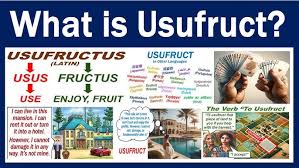
Because I wholly own our domicilio (primary residence), my Spanish will states that my widow, although she has no financial interest in our home, would benefit from usufruct and could continue living there until she too dies or decides to leave. My heirs, my children, cannot force her to leave.
Watch out for unfair charges by Hacienda
Spanish homeowners were handed a lifeline by the courts in a trio of rulings that blew the lid off unfair plusvalía municipal charges.
 In 2017, the Constitutional Court ruled (Sentencia 59/2017) that taxing a property sale with no profit – or even a loss – is unreasonable, allowing homeowners to challenge such demands. In 2017, the Constitutional Court ruled (Sentencia 59/2017) that taxing a property sale with no profit – or even a loss – is unreasonable, allowing homeowners to challenge such demands.
Two years later, the court struck again (Sentencia 126/2019), declaring the tax unconstitutional if it exceeds the profit made from the sale, branding it ‘confiscatory.’
Then, in 2021, the Constitutional Court delivered another decisive ruling (Sentencia 182/2021), declaring that the method used to calculate the plusvalía municipal was fundamentally flawed.
The court found that it did not accurately measure the real increase – or lack thereof – in property value. As a result, the tax was suspended temporarily, forcing authorities to create a new and fairer calculation method before it could be reinstated.
The bottom line
 If you’re over 65 or struggling to make ends meet, the rules might work in your favour. If you’re over 65 or struggling to make ends meet, the rules might work in your favour.
But beware – there’s no room for mistakes. Mis-steps could see the taxman chasing you.
Once again, use the notary. Don’t waste money on expensive, and sometimes slapdash, lawyers.
And don't believe everything you read in the Euro Weekly News!
Pablo, Rita and their kitten Paulinchen
© Pablo de Ronda
Further reading:
Foreigners who pay tax in Spain stand to cash in from next year
HOW TO ….. do your Spanish INCOME TAX return?
N.B. Notary Bene
N.B. Nota(ry) bene - Secret Serrania de Ronda
Where there’s a WILL … the process in Spain - Secret Serrania de Ronda
Photos and images:
Premier Consultants
Shutterstock
Symbolic
TeleAdhesivo
URBGIS
YouTube
Acknowledgements:
Euro Weekly News
Eye on Spain
Marc Menéndez-Roche
Notaria Isabel Colominas Rivas
Secret Serrania
Tags:
capital gain, capital gains tax, Constitutional Court, council tax, dos and don’ts of selling property, electricity levies, English-language newspaper, Euro Weekly News, exempt from taxation, Eye on Spain, General Council of Economists, ‘golden get-out clause’, grandchildren, Hacienda, IBI, IRPF, IVA, Isabel Colominas Rivas, lifetime annuity, lump sum, Marc Menéndez-Roche , mortgage paid off, municipal tax, Notaria, nuda propiedad, ownership rights, Pablo de Ronda, Paul Whitelock, pensioners over 65, plusvalía, plusvalía municipal, Premier Consultants, primary residence, professional advice, retirement, Secret Serrania, selling your property, Shutterstock, silver generation, silver lining, Spanish taxman issues warning to pensioners, Symbolic, tax breaks, TeleAdhesivo, time to travel, URBGIS, usufruct, usufructario, Valentí Pich, VAT, vehicle duty, YouTube
 0
Like
Published at 10:39 AM Comments (0)
0
Like
Published at 10:39 AM Comments (0)
Spam post or Abuse? Please let us know
|
|